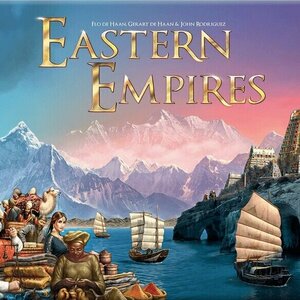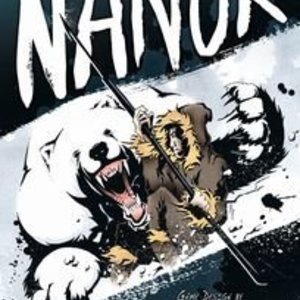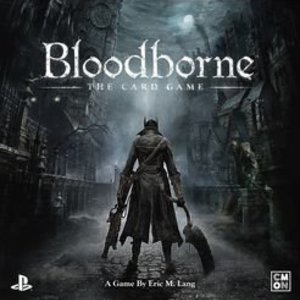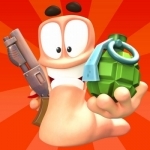Purple Phoenix Games (2266 KP) rated Nanuk in Tabletop Games
Jun 12, 2019
Nanuk, technically, is a polar bear. The same found on the cover of the game box. He is attempting to nom on an Inuit hunter. But worry not, in this game Nanuk does not eat people. Just the animals that have been hunted by the people to be brought back to the village as a result of your pig-headed boasting. Oh, you say you can bring back 17 fish in three days? I say you’re doomed.
I do not want to get in a habit of explaining games in my reviews, but I feel like Nanuk could benefit from it, so I will be quickly paraphrasing.
In Nanuk play goes around the table where each player must increase either the number of animals (and you can change the animal type) or the number of days of “the Hunt.” Example, I increase the current boast from three deer in one day to four birds in one day. Once a player no longer thinks the combination of animals and days will a successful hunt make, they must flip over their voting token to the doomed side. The last player to have upped the ante is the Hunt Leader and the naysayer is the, idk, Doom Leader I think. Then everyone evaluates the animal and Inuksuk (the awesome humanoid stone statue) cards to determine if they should join the Hunt or Doom team, flipping their voting token thusly. Every player then must contribute at least one card from their hand that will be shuffled together as the results of the Hunt. Should the boast parameters be met between the cards contributed and cards drawn from the deck (equal to the number of days boasted) the Hunt team wins and spoils are split among the team members. If not, the Doom team wins the spoils. At the end of the game you are hoping to have amassed sets and pairs of animals to score the most VP. There are a couple other rules that I will leave you to discover, but that is the… meat… of them.
I received my copy of Nanuk cheaply from a BGG auction many years ago. I was not sure exactly what to expect of it, but I was diggin the cover art. Once we played it, and played it again, and more, I began to love it more and more. It’s not a long game, the rules are relatively simple, and it is very much a social game. I wouldn’t necessarily call it a “party game” because that term just has different connotations to me, but it will play 5-8 players quite comfortably. Many times I have a group of 6 or more and this always delivers. Please give this one a try and I know you will enjoy it.
Someday we will start making lists and such, and this will go on my list of favorite games that support a larger play count. That said, Purple Phoenix Games gives this one a 12 / 18 (because Laura has not yet played it).
https://purplephoenixgames.wordpress.com/2019/01/16/nanuk-review/
Rikki Hammond (33 KP) rated Dominant Species in Tabletop Games
Jun 12, 2019 (Updated Jun 12, 2019)
Players choose one of many different types of species in the game, and try to become the dominant species of the game by expanding their species across the different hexagonal tiles on the board, through migrating, reproducing, and attacking other animals. If a player has more animals on a tile than other players, they are considered the dominant species of that tile and can therefore gain victory points from doing so.
Turns are determined by players placing their action pawns on different spaces on the grid to the right of the board. Once everyone has placed their pawns on the grid, actions are then worked from the top of the grid to the bottom. These actions include, but are not limoted to moving your species to another tile, attacking another species, or picking up an event card to use later. The game ends once this stack of event cards runs out, and final scoring takes place.
Each species starts out with a certain traits which means they are suited to a certain type of terrain. You can use one of your actions to gain different traits and therefore allows you to expand your species into different terrain tiles. The event cards are also useful in that they give you special abilities or can change the game in some way. This could be having your species migrate more than once in a turn, to removing every other species from your own tiles.
I like the way the turn mechanism works as it gives each player a little bit of freedom as to where they can place their pawns, and how soon they want their turn to be taken. There are a finite amount of spaces on each place of the grid so if you're action is taken up by other players before you get to it then that's just tough luck. I also like that the different species are slightly different and so gives the game a slight bit of replayability.
These are all the positives that I can give this game however. The game in general is just incredibly dull and boring to look at. Each species is differentiated by different coloured cubes and cones on the board. Take the player boards away and this game could literally be about anything you want.
The game also goes on for far too long especially at higher player counts, and especially if people don't quickly pick up those event cards, as that is the only way the game will end.
The game can also be horrendously unfair to a player. If you make one or two wrong judgements at the start of the game it can be nigh on impossible to come back from being in last place which to me, does not sound fun at all.
Personally I do not recommend dominant species as a game and I do think there are much better ones out there.
Connor Sheffield (293 KP) rated Bloodborne: The Card Game in Tabletop Games
Aug 20, 2018
From what I learned during my playthrough, this game is super fun and I can't wait to get my other friends to play it so we can play a proper 3-5 player game with the Hunters Nightmare Expansion including penalties to trophies etc.
This game requires tactics, teamwork and also careful planning to try and make sure your fellow hunters don't win. You can do this by using certain abilities of certain weapons that allow you to deal damage to the hunter yourself, allow the monster to deal damage or double damage to the player, or ensuring that you take little to no damage from the monster and allowing the other hunters to take the hit and/or fall. The game is very sneaky and you have to make sure that with the 7 card limit you have, that in the hunters dream you choose the right upgrades and new weapons and discard any others you won't need, but make sure that the cards you choose help kill the monster as well as hinder your fellow hunters.
However, you can choose to simply play the game and be fair to see who comes out on top by playing the right cards to hurt the monster more and not harm each other...but where's the fun in that?
If you've played the video game, then you'll love the card game as it has all your favourite elements such as blood echoes, weapons, health vials, molotovs, and of course the monsters! Including mini bosses and a single Final Boss card who's effects are apparent throughout the entire game. For example, the Vicar Amelia boss card, cuts players health's down from the maximum of 8, to the new maximum of 6 during the entire game no matter what other cards are played. If you have a card that says return to Max health, your new Max health is 6 which makes the game harder but also makes you think more strategically, and you have to ask yourself that one question each turn "Am I willing to take the risk?"
The payoff as in the video game, is sweet and the fall also as in the game, is bitter, especially if you took that chance whilst holding unbanked blood echoes.
My only issue with the game is that I believe there could have easily been some form of the game that allowed for just two players, but instead Myself and others like me on the internet have to come up with hosuerules, and be careful not to take away the fun of the game, as well as being careful not to drift to far from the original rules so that it doesn't become too easy. Because again, where's the fun in that?
I highly recommend this game and it's expansion to those who have the friends willing to play and not lose their sh*t when things don't go their way :')
Purple Phoenix Games (2266 KP) rated Funny Pages: A Comical Puzzle Game in Tabletop Games
May 26, 2021
Funny Pages is a puzzle game for any number of players and any gaming skill level. In fact, as there are so few rules, this may be a somewhat perfect game (game?) for non-gamers. Read on.
DISCLAIMER: We were provided a prototype copy of the Promo Pack for the purposes of this preview. These are preview copy components, and I do not know for sure if the final components will be any different from these shown. You are invited to back the game through the Kickstarter campaign, or through any retailers stocking it after fulfillment. -T
To setup, open the envelope (or box, if playing the boxed final version) and display the cards. Done. Easy like Sunday morning.
Funny Pages is not a turn-based game, but rather an exercise in visual clue-hunting and some amount of Google-fu. In this Promo Pack, each card represents a day of the week, and some must be on Easy mode, because I was able to solve them pretty quickly. Others, I believe, echo the difficulty of the aforementioned Wish You Were Here.
In any case, the goal of this Promo Pack is to match up the puzzle with the correct day of the week. And while that sounds very easy, the puzzles certainly are not. Good luck to all who attempt!
Components. Well, these are large, oversized cards with linen finish and obviously amazing art. I am unable to speak on the final components, but have been assured that the game is 100% ready to go, so if it mimics the provided Promo Pack, these are a great size and feel.
I will be poring over these cards much much more until I absolutely figure every one of them out. I am still a bit away from that goal, but these puzzles are definitely more my speed than what I experienced previously. Some of the comics are actually funny, even when taken out of context of the game. I like the comic art style (naturally), and having clever puzzles embedded just makes them even more enjoyable.
I must admit that after solving a few of these I am feeling more confident in my ability to solve the others. I just need to take more time and think with alternate logic. Is alternate logic a thing? If not, I call dibs on coining the term. I very much enjoy these, and I think it is partly due to the fact that they look great and all seem to offer a different type of puzzle on each card. If this is something that piques your interest, then I recommend you check out the upcoming Kickstarter campaign to add this little gem to your collection. If nothing else, use it as a distraction for unwanted guests on your coffee table. Challenge them to solve the lot in a time frame and watch them go to town.
PS – Please do not ask me for hints. I may be wrong on some of my solutions.

Photo Captions HD
Photo & Video and Social Networking
App
★ Featured on the App Store as an app to "Show Mom You Care" ★ ★★ Macworld.com: Fun image...

My Disney Experience
Travel and Lifestyle
App
The official Walt Disney World® app! Now it’s easier than ever to plan and share your vacation...

Financial Ratio Flashcards, Analysis, and Accounting
Business and Education
App
Learn about finance and accounting with over 100 flashcards coordinated with video, audio, and...

Solitaire City Classic
Games and Entertainment
App
No ads or In-App purchases! Play Klondike solitaire, the world's most popular solitaire/patience...

Eastern Empires
Tabletop Game
Eastern Empires is a board game for 3 to 9 players and covers the development of ancient...





The Marinated Meeple (1853 KP) Jun 12, 2019
Purple Phoenix Games (2266 KP) Jun 12, 2019